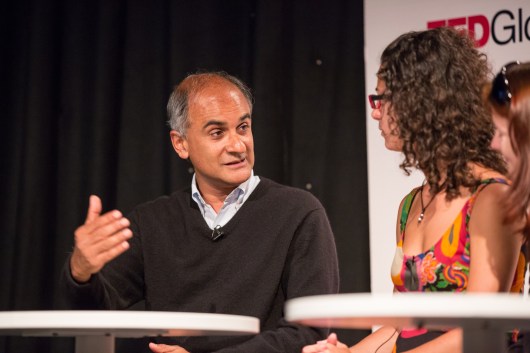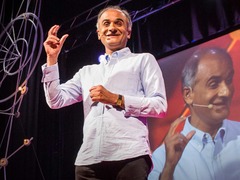
In conversation about living in several languages and locations, Pico Iyer talks with a panel of Open Translation Project volunteers at TEDGlobal 2013. Photo: Ryan Lash
In today’s thought-provoking talk, author Pico Iyer looks at the complex nature of the simple question: “Where are you from?” Because while his family comes from India, he grew up in the United Kingdom. As soon as he left school, however, he moved to the United States — where he was required to carry a card declaring him a “permanent alien” for years. Meanwhile, Iyer’s wife is Japanese, and her native country is the place where he tries to spend as much time as he can because it speaks so deeply to him. Iyer calls these diverse locations the pieces of his “stained-glass whole.”
 Pico Iyer: Where is home?
Iyer notes that he is hardly alone — 220 million people live in a country that is not their own. Younger generations often find themselves influenced by overlapping waves of cultures — they have connections to the cultures of their parents (which are often different) and the cultures of their spouse. At the same time, they have their own connections to where they’ve lived and they’re also influenced by the places that they’ve loved in their travels — the locales that have shaken them out of their assumptions of how things are done and shown them the “secrets patterns of the world.”
Pico Iyer: Where is home?
Iyer notes that he is hardly alone — 220 million people live in a country that is not their own. Younger generations often find themselves influenced by overlapping waves of cultures — they have connections to the cultures of their parents (which are often different) and the cultures of their spouse. At the same time, they have their own connections to where they’ve lived and they’re also influenced by the places that they’ve loved in their travels — the locales that have shaken them out of their assumptions of how things are done and shown them the “secrets patterns of the world.”
These overlapping cultural influences, of course, greatly change the meaning of the word “home” and “community.” These things are no longer assigned, as they were for past generations, but are in many ways self-woven.
At TEDGlobal 2013, Iyer sat down for a discussion with a group of TED Open Translation Project volunteers, who take talks given primarily in English and translate them into a wide variety of languages. Part of the “TED Found in Translation Series” hosted by Skype, this discussion session was hosted by TED’s own Doug Chilcott and brought together translators from Sri Lanka, Poland, Spain, Portugal, Armenia and Uzbekistan. Together, these translators — some in the room and some on the screen — talked through questions like “Are there ideas that are foreign?” and “Is foreignness extinct?” with Iyer.
Iyer’s take is more nuanced than the view that the global nature of our world is melting cultures together.
“Get off the plane tomorrow in India, Haiti or Yemen and you will be as displaced and confounded and unsettled as ever you were,” says Iyer. “[Still] it’s true that people have more and more cultures inside of themselves. If you think about the archetypical global being — let’s say Barack Obama — he’s not a foreigner in Kenya, or Indonesia or the United States. He’s partially at home everywhere.”
In this discussion, which you can watch below, Iyer also takes on the notion that English is killing off other languages.
“I think the world is always going to be as diverse as it always has been,” says Iyer. “Even if everybody in this room is speaking English 20 years from now — if you have a Mongolian, Norwegian and a Bolivian person all speaking English, I think they would still be as far apart as when they were speaking Mongolian, Norwegian and Bolivian because of the values and implications behind each word. Even the way that they’re using English and importing their own terms into it. “
He concludes, “I don’t see the world becoming heterogeneous … The more globalized the world becomes, the stronger is the power of the local.”
Watch the video below for many more fascinating insights in this conversation.
Comments (11)
Pingback: The Expat’s Aging, Caregiving and Related Journeys: Why Bring Them Up | The Last Boarding Call
Pingback: Permanent Alien…or Third Culture Kid – Roots Manoeuvres
Pingback: What is Home. | YUKARIGRAM
Pingback: Defining “home”: soil versus soul | American Turban